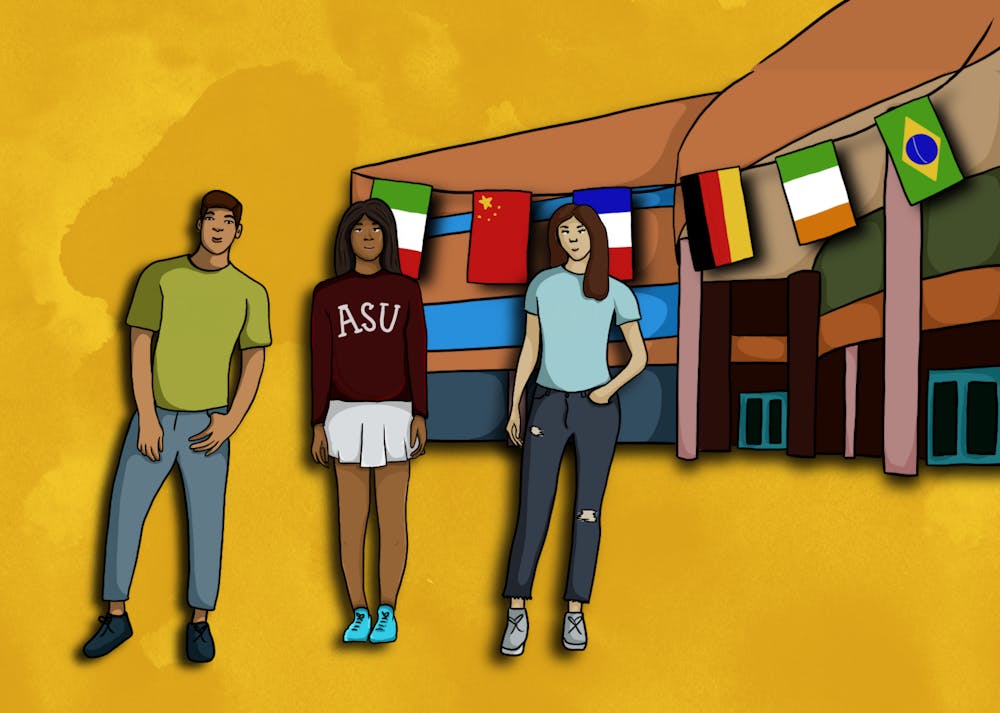The School of International Letters and Cultures offers Sun Devils more than 20 languages to learn. Ranging from Arabic to Romanian, students can delve into minor languages that have a large impact on our society and are even crucial to our government.
Students can attain several types of degrees within language programs. In Portuguese, the degrees offered include two certificate options: Brazilian studies and Latin American studies, which teach students about the culture and its industries. The newest aspect is the Portuguese minor, which was first offered in the fall of 2023.
"We continue to add more courses and more opportunities," Cezar Medeiros, an associate teaching professor of Portuguese, said. "We are partnering with the University of Arizona in a study abroad program, so there is a lot of opportunity, and we continue to grow significantly."
For students interested in taking courses related to the Portuguese language, UArizona: Portuguese in Brazil allows them to immerse themselves in the culture, lifestyle, and language.
Portuguese enables several career possibilities, especially in Brazil, which has a large Portuguese-speaking population and economy. Medeiros said that the U.S. government even considers Portuguese a critical language.
Students can learn about the language through classes, and several clubs are dedicated to it. The Portuguese Club allows students to practice speaking the language and learn about the culture and customs; the Brazilian Club celebrates everything about Brazilian culture; and the SILC Attachés Club is about several different languages coming together.
ASU also offers Russian as another language option for students to pursue.
"(Russian is) hugely important," Hilde Hoogenboom, an associate professor of Russian, said. "We are a small language program compared to some of the larger programs at ASU, but at the same time, we are one of the three main critical languages for the U.S. government."
Over the years, the Russian program has changed significantly since Hoogenboom taught at ASU. The need for language within the government has increased since the war in Ukraine. Studying abroad for the program has switched from visiting Russia to visiting countries formerly in the Soviet Union.
"There's been a lot of changes in programs around the country," Hoogenboom said. "So, of course, we are paying attention to what's happening to the field around the country."
The Critical Languages Institute at ASU's Melikian Center offers these study abroad programs. Students can learn in Bishkek, Kyrgyzstan, and practice the language and traditions.
READ MORE: How Sun Devils can go global: A guide to understanding study abroad programs
ASU also has Russian clubs, such as the Russian Student Association, where students can bond about Russian culture and linguistics.
Students learn languages at ASU for various reasons. Grae Shoup, a freshman studying Spanish linguistics, takes Spanish and Chinese classes because she is fascinated with languages.
"I've been learning Spanish for seven years, and I've always wanted to learn Chinese because I thought it sounded very beautiful and the written language looked so gorgeous," Shoup said.
ASU offers the Chinese Flagship Program, an intensive way to learn Chinese sponsored by a Department of Defense program. In the final year of the program, students can go to the University of China, Taiwan, or the Defense Language Institute in Monterey, California.
Shoup said she has thought of double majoring in Spanish linguistics and Chinese because of the ability to experience learning another language and connecting with others.
"Just having the experience of learning another language or being able to connect with others, or if you wanted to move to China, or you wanted to work in a business that had a lot of communication with China, it's very helpful," Shoup said.
Edited by Katrina Michalak, Walker Smith and Caera Learmonth.
Reach the reporter at sjames51@asu.edu and follow @sennajames_ on X.
Like The State Press on Facebook and follow @statepress on X
Senna James is a Managing Editor at The State Press. She is in her 5th semester with The State Press working previously as Community and Culture Editor and Community and Culture reporter.




